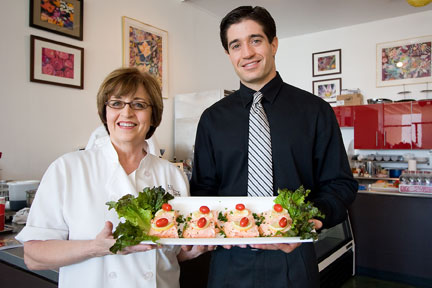In many ways, Z’s Café is like any other small restaurant. Block letters spelling “HOPE” sit on the counter. Inside a display case are plates of tilapia, gazpacho, and “the best chicken salad in Fort Worth” arranged on immaculate trays. Paintings and photos by local artists hang on the walls.
 But Z’s co-owners Janet and Carlo Capua want to do more than serve up tasty food in pleasant surroundings. The mother-son team behind the restaurant located inside the Fort Worth Community Arts Center also want to provide a creative, rewarding outlet for Fort Worthians affected by HIV or homelessness. All 10 of Z’s employees come from Samaritan House, a 16-year-old nonprofit organization based on the South Side that provides housing and support services for HIV-afflicted or homeless residents.
But Z’s co-owners Janet and Carlo Capua want to do more than serve up tasty food in pleasant surroundings. The mother-son team behind the restaurant located inside the Fort Worth Community Arts Center also want to provide a creative, rewarding outlet for Fort Worthians affected by HIV or homelessness. All 10 of Z’s employees come from Samaritan House, a 16-year-old nonprofit organization based on the South Side that provides housing and support services for HIV-afflicted or homeless residents.
“It has just been fantastic,” said Sarah Deats, Samaritan House director of communications. “These residents take on a whole new state of mind.”
The partnership is the brainchild of Janet and Samaritan House CEO Steve Dutton. Last May, after Janet had been laid off after 40 years as a dental hygienist, her son asked her, “Mom, if you could do anything, what would you do?” Her response was immediate: “I would cook for people.”
A couple of months later, Janet and Carlo started Janet Z Capua Catering, using the Samaritan House’s kitchen as their base of operations. In exchange for the space, the Capuas fixed free lunches for quarterly Samaritan House advisory board meetings. Dutton soon asked Janet and Carlo if they would be interested in opening a café inside the arts center. They jumped at the opportunity. Getting up and running took only a couple of months. Decorations and plates were bought from local thrift stores, and a local Panera Bread restaurant donated the furniture: enough stainless steel tables and chairs to seat about 30. The grand opening was in mid-February.
In return for a pledge to hire only Samaritan House residents, the Capuas receive help from Dutton with scheduling, accounting, and recruitment.
The menu is pretty diverse. There are the standards – a turkey-apricot wrap, pimiento cheese sandwich, and chicken salad (all for about $6) — but there are also rotating off-the-menu specials, including fresh salmon (Fridays) and homemade mac ‘n’ cheese (Tuesdays), plus ravioli, quiche, steak, homemade Italian sausage, and more. The café is open only for breakfast and lunch.
Three years ago, employee Marlin Richey lived in Dallas and worked for a commercial real estate company. He was a drug user, favoring crystal meth but willing to try whatever was available. Eventually, his bills piled up, he lost his home, and he lived on the street for weeks. Then things got worse: He was diagnosed as being HIV-positive.
He entered a drug rehabilitation program about two years ago. “I had hit the bottom,” he said. But that’s where he heard of Samaritan House. He applied for help there and was accepted. He soon moved into a one-bedroom apartment at the Fort Worth complex.
About six months ago, Deats contacted him about working at Z’s. Richey took the job immediately.
When Carlo isn’t at the café, Richey is in charge. A few weeks ago, Carlo promoted him to assistant manager.
Before opening Z’s Café, Janet had never worked with people affected by HIV. But she knew that partnering with Samaritan House was the right thing to do. “Everything said go for it,” she said.
Janet saw her new employees as “empty plates — but you fill them up and make them beautiful.”
Janet wants to expand Z’s. She wants to buy catering trucks and hire more workers from Samaritan House. But she doesn’t want her business to grow so much that she can’t work directly with her employees.
In August, Z’s Café and Samaritan House will partner with Imagination Celebration Fort Worth, a nonprofit performing arts organization, to present Arts for Life, a program at the arts center that will offer art lessons and activities about different cultures for children. Z’s will help the kids create theme-based snacks, and Samaritan House residents will sell their handmade crafts and jewelry.
Response from customers has been great, Carlo said. There haven’t been any complaints, and no one has expressed concern over the handling of food by HIV-positive people. The workers wear gloves at all times. “Safety is our number-one priority,” he said.
As for Richey, he’s been clean for seven months. The Capuas are sending him to a local school to become a sushi chef.
“This has given me a second chance,” Richey said. “They know where I’ve been, and they know where I can go.”











